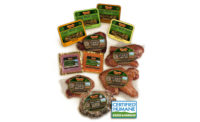The burger is going through some changes, as consumer trends are having an effect on the patty. There are patties for every type of consumer, from fresh to frozen, from full-sized to slider, and from beef to turkey to plant.
In 2019, plant-based products like the Impossible Burger and the Beyond Burger made headlines for their sales. Plant-based meats had sales of nearly $1 billion in 2019, according to Nielsen, representing an increase of more than 10.2 percent over the previous year.
A plant-based burger patty may seem like a healthier choice — that’s how it is marketed in many cases, but the truth behind the claim is questionable. Certainly, it would fail a test for consumers looking for a clean label. One popular line of plant-based burger patties includes expeller-pressed canola oil, refined coconut oil, methylcellulose and potassium chloride.
Dr. Madelyn Fernstrom, NBC News health editor, wrote about foods with “health halos” — products that sound healthy but aren’t necessarily so once you look at the nutritional labels. She said these meatless burgers fall into that category and are considered “ultra-processed,” due to the number and types of ingredients.
“That’s because they aim to replicate the taste of beef, not a plant. That’s not an easy task,” she writes.
There is a middle ground between the two extremes of a plant-based meat burger and a meat burger. New ingredients are being developed that can be added to the ground beef, not as an inclusion but as a substitute. The resulting blend can create a “lighter” product that keeps the taste of a meat patty but with characteristics – fewer calories, less meat consumption – that people find appealing about the plant-based products.
Botaniline, an early stage food science company, has developed an all-natural, plant-based food technology that can be used to create healthier processed meats and proteins. Botaniline’s one-ingredient substitution of potato allows processed meat and protein manufacturers to eliminate fillers, binders, allergens, and chemical additives.
“Though plant-based proteins are helping to create more sustainable products that are better for the environment, many of the meatless items are much higher in sodium, fat, and harmful processing chemicals and ingredients,” says Heather Ryan, director of marketing for Botalinine. “By substituting a percentage of the meat block with our plant-based ingredient, processors have the opportunity to create both a healthier and more sustainable product that tastes great.”
This food technology was invented by Dean O’Brien, Botaniline co-founder and Principal Food Scientist, as well as Vice President of Operations at Wardynski & Sons. It has been fully approved by the USDA and Food and Drug Administration (FDA), and it is in full commercial use. Wardynski & Sons, a Buffalo, N.Y.-based processor, has used the product in its hot dogs, sausages, bologna and other products. It has been used in burgers by other processors.
Skip Wardynski, owner/operator of Wardynski’s, says the development process took about seven years, which included hundreds of test batches to get the taste and texture right.
“The Botaniline ingredient replaces 10 to 20 percent of the meat block which results in up to 40% less calories, fat and saturated fat, up to 95% less sodium, and the elimination of harmful chemical and allergen additives including soy, lactose, gluten, MSG, TVP, and more,” he says, adding that the company’s products have been introduced to schools, healthcare facilities, and the U.S. military which are all looking to lower sodium in the meals they serve.
“Our goal from the start has been to create a product that makes processed meat healthier and are so proud of what we have accomplished,” Wardynski says. IP







